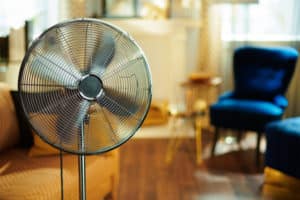- Minimize hot water use by taking shorter showers and washing your clothes in cold water.
- Use your dishwasher and washing machine only with full loads.
- Dry clothes in the sun (check your covenants, clotheslines are prohibited in some communities.)

- Try setting your water heater at 120 degrees.
- Close doors to seldom used rooms and turn off heat or air conditioning in these areas.
- Clean or replace heater and air conditioner filters regularly. Keep outside vents free of leaves or debris that may clog vents.
- Use kitchen, bath, and other exhaust fans sparingly. These fans can blow away a house full of heated or cooled air in an hour.
- Keep your fireplace damper closed unless you have a fire going. An open damper can let as much as 8 percent of your heat go out the chimney. The warmth from a fire on the hearth generally doesn’t radiate through the house; the heat gain is confined to the room with the fireplace. In fact, a considerable amount of heated air from other parts of the house can go wastefully up the chimney when a fire is going.
- To lessen heat loss when you use your fireplace and the furnace is on, lower the thermostat setting to 50 or 55 degrees. Some warmed air will still be lost, but the furnace won’t have to use as much fuel to keep the rest of the house at its usual temperature.
- Close all doors and warm air ducts to the room with the fireplace, and open a window near the fireplace half an inch to an inch. Air needed by the fire will be provided through the open window, and the amount of heated air drawn from the rest of the house will be reduced.
- When the heat is on, set your thermostat at as low a level as you feel comfortable. You save for each degree you lose the average temperature of your home.
- Keep windows near your thermostat tightly closed otherwise it will keep your furnace working after the rest of the house is heated to the desired temperature.
- If you have oil heat, have the firing rate checked periodically.
- Dust and vacuum radiator surfaces frequently. Dust and grime impede the flow of heat.
- Keep draperies and shades open in sunny windows; close them at night.
- For comfort in cooler indoor temperatures, use the best insulation of all – warm clothing.
- Keep your cooling system well-tuned by a professional service person.
- Set your air conditioner thermostat as high as you still feel reasonably comfortable.
- Don’t set the thermostat at a colder setting than normal when you turn on your air conditioner. Your house will not cool any faster.
- If you have window air conditioners, turn them off when a room will be vacant for a few hours. You’ll use less energy cooling the room down later than if you had left the unit running.
- Use a fan in conjunction with your window air conditioner.
- Don’t place lamps or TV sets near your air-conditioner thermostat. Heat from these items is sensed by the thermostat and could cause the air conditioner to run longer than necessary.
- Keep out daytime sun with blinds or shades.
- Keep lights off in vacant rooms.
- Use large appliances in the early morning and late evening.
- Open the windows and use a fan on cooler days.

- Dress appropriately for the warmer indoor temperatures.
- Use cold water rather than hot when running the garbage disposal.
- Boil water in a covered pan; the water boils faster when the pan is covered.
- Keep range top burners and reflectors clean so your stove operates at peak efficiency.
- When using an oven or an electric burner, turn it off a little while before the cooling is done. The oven element will stay hot after you turn it off.
- When you have a choice, use the range top instead of the oven.
- Scrape dishes before loading them into the dishwasher so you won’t have to rinse them.
- Let your dishes air dry.
- Don’t use the “rinse hold” on your dishwasher for just a few soiled dishes.
- For Tips on how to improve your home’s energy efficiency and save money go to Improve Your Home’s Energy Efficiency with Technology on the NAHB website.
Following are some suggestions on ways to save water:
- Take showers rather than baths. Showers use about a third as much water.
- Take shorter showers.
- Avoid leaving the water running while shaving and brushing teeth.
- Don’t use the toilet as a trash can.
- Use the dishwasher and washing machine only with full loads.
- Don’t run water continuously for vegetable and dish washing.
- Water lawns in the morning to avoid evaporation.
- Keep grass at least two inches high to shade roots.
- Use mulch or ground covering plants to prevent excessive evaporation.
- Use waste water from the house to water your garden.
- Plant native or drought tolerant plants.
- Water trees slowly, deeply and infrequently to encourage deep rooting. A slow drip for an hour once a week should be sufficient for most trees.
- Use a broom rather than the hose to clean off walkways, patios and other outdoor areas.
- When washing your car, use a bucket of water or a hose with an automatic shut-off nozzle instead of letting the hose run.

Reduce the amount of garbage you generate by buying and using products wisely:
- “Recycle” by purchasing products in recyclable containers.
- Purchase foods in bulk or concentrate.
- Avoid products that are neither reusable nor easily recyclable.
- At work, make two-sided photocopies.
- Use cloth towels in the kitchen rather than paper towels.
- Stop unwanted junk mail by removing your name from mailing lists.
Reuse product whenever possible:
- Start a compost pile with your leaves and grass clippings.
- Leave a coffee mug or two at work and avoid using disposable cups.
- Use blank back sides of used paper for scratch work.
- Look into purchasing quality used items instead of new ones.
- Take your grocery bags back to the market and reuse them.
- Mend clothes and repair broken items.
- Take care of your belongings to help them last longer. In particular, try to keep your car on a regular maintenance and tune-up schedule.
- Use products that are made to be reused, such as cloth towels, sponges, glass dishes and metal eating utensils (rather than paper and plastic), rechargeable batteries, etc.
- Drop off your used motor oil, antifreeze, and car batteries at places that recycle automotive wastes.
- Donate clothing, books, toys, appliances and furniture to charitable organizations.

Insulation: According to the study, all types of insulation can be expected to last a lifetime if they are properly installed and are not punctured, cut, burned or exposed to ultraviolet rays and are kept dry. Proper installation not only extends the lifetime of your insulation, it also ensures that it will perform properly, resulting in reduced energy use and expenses, as well as increased home comfort.
Windows: Windows, because they can be exposed to extreme weather conditions, have a much shorter life expectancy. The study, which polled experts in the various fields, found that aluminum windows can reasonably be expected to last 15 to 20 years and wooden windows can last upwards of 30 years. An important element of maintaining your windows is the window glazing – the putty that secures the glass to the sash. Over time, this glazing can crack, resulting in drafty and loose panes. Available at any hardware store, glazing can be replaced by simply chipping or scrapping off the old putty, cleaning the window thoroughly and installing new glazing with a putty knife or caulking gun. Some types of glazing require a coat of latex paint for weather proofing.
Roofs: Like windows, the life expectancy of a roof depends on local weather conditions as well as appropriate maintenance and quality of the materials. Slate, copper and clay/concrete roofs can be expected to last more than 50 years. Roof made of asphalt shingles should last for about 20 years; fiber cement shingles should last about 25 years; and wood shakes for about 30 years. In regards to roof maintenance, it’s important to be proactive to prevent emergency and expensive repairs. Look for damaged or loose shingles; gaps in the flashing where the roofing and siding meet vents and flues; and damaged mortar around the chimney (especially at the joints, caps and washes). If you see any signs of damage, call a professional to repair it.
Paint: Although some avid decorators may repaint every six months, homes usually need to be painted every five to 10 years depending on the content of the paint (its glossiness), its exposure to moisture and traffic. Quality paints are expected to last upwards of 20 years. Exterior paint conditions should be regularly monitored in order to catch problems early on. Assessing paint for dirt, mold, cracking, peeling, fading and rusting – and repairing immediately, usually through simple cleaning methods such as scrubbing or power washing – can end up saving homeowners much more costly repainting jobs in the long term.
What Home Owners Need to Know About Lead Paint.
Exterior Home Painting Tips.
Remember, these numbers are averages, with usage, weather, maintenance and a number of other factors influencing life expectancy. Chances are, changing trends will dictate a shorter life span, as homeowners update and remodel their homes. For more information on home maintenance, visit the National Association of Home Builders website.
Stay in Your Current Job
Keep your employment stable unless it’s absolutely necessary to make a job change. Lenders like to see a consistent work history and changing employers can create an uncertainty about your future, particularly if your salary is commission-based. Also avoid a change to self-employment. When approving a loan, lenders usually like to see a two-year track record of self-employment income. In addition, self-employed workers tend to include a lot of expenses on their tax returns, especially when initially getting off the ground. These expenses reduce your income to qualify for a home loan.
“When you are approved and underwritten for a loan, it is contingent upon your financial situation at the time of the application,” said Tim Doyle, senior director of Mortgage Bankers Association in Washington, D.C. “If there is a change in your financial position, you need to contact the lender, and they may have to reunderwrite your loan, particularly if the change is significant. This can cause delays in your closing.”
Wait to Move Money Around
To ensure quality control and eliminate potential fraud, many mortgage lenders require you to document the source of all of your funds. You may have to provide a paper trail, including cancelled checks, deposit receipts and other seemingly trivial data, which can get quite exasperating. Moving money around between checking and savings account, money market funds, mutual funds or even retirement accounts – even if you are consolidating funds to make it easier – could leave you and your lender with an extreme headache trying to properly document it all.
 Hold Major Purchases Until AFTER Closing
Hold Major Purchases Until AFTER Closing
Why? The biggest reason is to stabilize your debt-to-income ratio, the percentage of your gross monthly income (before taxes) that you spend on debt such as monthly housing costs, credit cards, student loans, installment debt and car payments. A major purchase reduces the amount of income you have available for your home mortgage. And reduced income may convince the bank you can’t afford a new home.
Your best bet is to wait for that new car or home entertainment system until after closing.
“At closing, lenders often are required to recertify your loan application to ensure its accuracy,” said Doyle. “If you’ve taken on more risk since your initial approval, such as buying a car or new furniture, or opening a new line of credit, you could put your loan in jeopardy.”
Use a Third Party to Manage a FSBO Deposit
Many war stories have been told about For Sale by Owner (FSBO) sellers who spent “good faith” deposits prior to closing. When the transaction is canceled for valid reasons such as repair or financing issues, buyers have to battle for a refund. A better choice is to put the deposit in a trust account and find an attorney or other third party who will safeguard the money until after closing. Be sure to state in your contract what happens to the deposit if the transaction doesn’t occur.
Keep Your Emotions in Check
Most likely you have fallen head over heels for your new home, but be careful not to let Cupid’s arrow lead you astray. Buying a house is a business transaction, and you must have a cool head throughout the deal. Try not to fall so much in love that you ignore major repairs that you can’t afford, while keeping in mind no home is perfect. Avoid walking away from a terrific home because of a seller’s refusal to do a small repair.

Work with Builders and Be Realistic
“If you are building a new home, be proactive and work with your builders early on,” said Bill Watson, Member, Institute of Residential Marketing (MIRM), and president of Bill Watson and Associates, Inc. in Aurora, Colo. “By getting involved early on with decisions such as color and carpet selections, you will receive more cooperation from the builder and a wider variety of choices. And most importantly, you won’t be waiting to close because your dream home isn’t ready.”
On another note, if your new home’s closing is contingent on selling your old home, Watson suggests being realistic about its sale and marketing. “You don’t want your new home purchase to fall through because your old home is still on the market.”
Estimate Closing Costs Well in Advance
In many cases, closing costs can be as much or more expense than the down payment required to purchase a new home. “Always have sufficient funds for closing costs,” said Doyle. “Keep a buffer of extra money as well to cover unanticipated costs.” It is also advisable to keep in close contact with your lender so that you know what to expect come closing day. Understand the numbers and don’t hesitate to ask questions, so that you fully understand the lender’s requirements. The more you know going in, the easier it will be to buy your new home.
Remember to Hire Representation
Chances are the seller has a broker. Make sure you have good representation on closing day, whether it is your broker, attorney or both. Having representation ensures that all bases are covered and no detail is missed.
By following these few suggestions, closing day will leave you as a blissful homeowner. For more information on buying a new home, visit the How to Navigate the New Closing Rules on the NAHB website.
